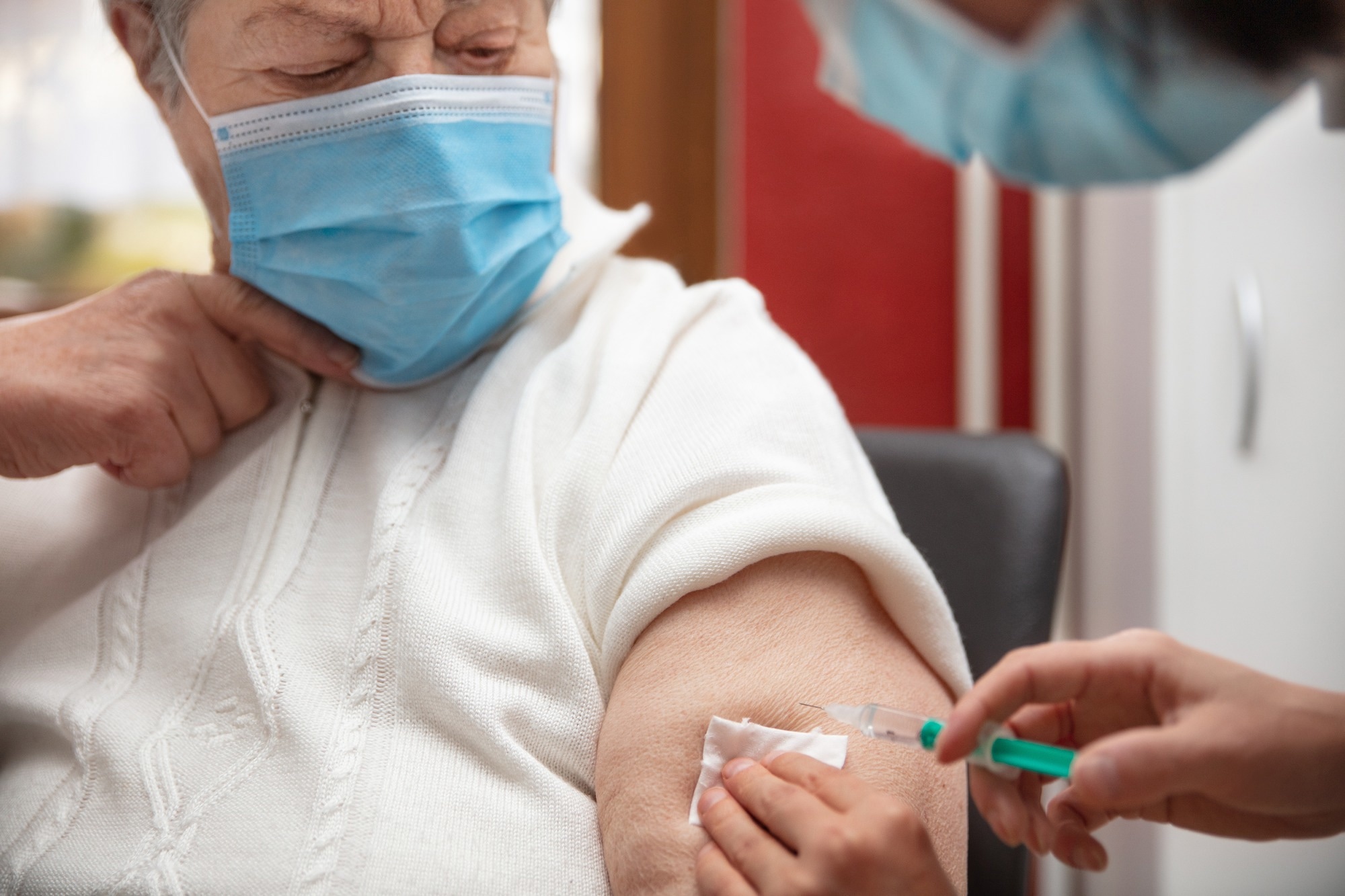If yes, they further investigated whether or not receipt of bivalent vaccine prevented severe COVID-19–associated outcomes, including mortality given nursing home residents' age, comorbidities, and exposure to infectious agents in a congregate setting.
Additionally, the researchers described the effectiveness of up-to-date vaccination status versus not being up-to-date.
 Study: Effectiveness of Up-to-Date COVID-19 Vaccination in Preventing SARS-CoV-2 Infection Among Nursing Home Residents — United States, November 20, 2022–January 8, 2023. Image Credit: MiriamDoerrMartinFrommherz/Shutterstock.com
Study: Effectiveness of Up-to-Date COVID-19 Vaccination in Preventing SARS-CoV-2 Infection Among Nursing Home Residents — United States, November 20, 2022–January 8, 2023. Image Credit: MiriamDoerrMartinFrommherz/Shutterstock.com
Background
The NHSN defined up-to-date COVID-19 vaccination as the receipt of a bivalent messenger ribonucleic acid (mRNA) technology-based COVID-19 vaccine or a primary series within the preceding two months, starting from October 2022.
However, its effectiveness in preventing severe acute respiratory syndrome coronavirus 2 (SARS-CoV-2) infection among nursing home residents remains unknown.
Residents were not up to date for the following four reasons:
i) they received booster doses of monovalent vaccines;
ii) received the primary series of vaccines only (around two months earlier);
iii) received only a dose of the primary series;
iv) did not receive any COVID-19 vaccine.
About the study
In the present study, researchers used NHSN nursing home COVID-19 data for the period between November 20, 2022, and January 8, 2023, to describe the vaccine effectiveness (VE) of a bivalent COVID-19 mRNA vaccine dose (up-to-date vaccination status) in preventing laboratory-confirmed SARS-CoV-2 infection among nursing home residents.
They chose a study period for analysis when the COVID-19 bivalent mRNA vaccine received approvals in the US and COVID-19 cases surged during winter.
The NHSN data comprised the number of SARS-CoV-2-infected cases and the number of nursing home residents stratified by patient vaccination status. Notably, in the US, all Centers for Medicare & Medicaid Services (CMS)-certified nursing homes submit weekly incident COVID-19 cases and vaccination data to NHSN.
The CDC authorities calculated the proportion of nursing home residents who were not up-to-date with COVID-19 vaccines during the study period using this data. To this end, they subtracted the number of residents who were up to date from the total number of residents in the facility.
Likewise, they computed resident weeks by compiling the number of residents who spent one or more days at the nursing home facility during the data collection for the complete study duration.
Furthermore, the team used a zero-inflated negative binomial mixed model to determine the ratio of SARS-CoV-2 infection between residents with an up-to-date vaccination status versus those with no updated status while accounting for potential confounders.
The study model used the nursing home randomly to understand inter-facility variability. The study covariates were calendar week, social vulnerability index (SVI), and county-level incidence, to name a few. Finally, they estimated VE against SARS-CoV-2 infection as one − rate ratio x100.
Results
The study analysis encompassed NHNS compiled data for 14,464 nursing homes and 108,727 weekly reports of incident COVID-19 cases and vaccination data.
In total, 4,314,714 nursing home resident weeks and 52,853 COVID-19 patients in these homes were up to date with COVID-19 vaccines and had received a bivalent mRNA vaccine dose.
Compared to residents who were not up to date, those who were up-to-date with a bivalent COVID-19 vaccine had a lower crude infection rate, i.e., 12.3 versus 16.6 per 1,000 resident weeks. However, the proportion of nursing home residents who were up to date increased to 51.2% during the study period.
Receiving a bivalent mRNA COVID-19 vaccine reduced the prevalence of COVID-19 in nursing home residents each week.
Accordingly, they had 7.6 to 15.3 weekly cases per 1,000 residents, whereas those who were not had between 11.1 and 19.1 weekly cases per 1,000 residents. Likewise, the adjusted rate ratio for COVID-19 was 0.69.
Most importantly, VE against SARS-CoV-2 infection in nursing home residents who had received the bivalent vaccine was 31.2% after adjusting for the week, county-level COVID-19 incidence and social vulnerability index (SVI), and nursing facility-level percentage of staff members.
Conclusions
This CDC report highlighted the need for COVID-19 vaccination of nursing home residents, which now encompasses an additional dose of a bivalent mRNA vaccine, especially for immunocompromised elderly aged ≥65 years.
Thus, staying up-to-date with recommended age-appropriate COVID-19 vaccination is necessary for protection against SARS-CoV-2 infection.